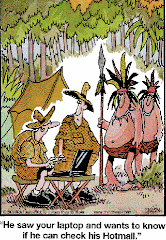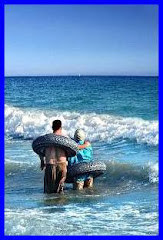 (EBA Chairmen Gamal El-Nazer & Said El-Tawil)
(EBA Chairmen Gamal El-Nazer & Said El-Tawil)
By Hoda Nassef
WILL EGYPT (REALLY) REBUILD IRAQ???
Egyptian Businessmen's Association president, Mr. Aly Gamal El-Nazer, has a plan for the economy. But will his 450 members co-operate?
Today's Egyptian Businessmen's Association is neither an elite gentleman's cigar club nor an impotent NGO. The 450-member EBA has grown into a group of serious business leaders shaping the way business is done in Egypt. EBA Chairman Aly Gamal El-Nazer, who took over the reins a few years ago from 21-year veteran Said El-Tawil, talked to me about government influence rebuilding Iraq and Egypt's export potential.
Q. What exactly is the EBA?
It's a non-governmental and non-profit organization. It's different from other organizations like the federations of industries and chambers of commerce, because we are much larger in scope. We have professional and public-sector members, but it is an NGO with a focus on how to serve the business community at large and in particular our members. And we consider ourselves as consultants to the government on various economic, financial and technical matters.
Q. Wasn't the government recently trying to clamp down on NGOs? Why the clash?
It's not really a clash. I think the government realizes that some of the NGOs, especially those that are financed from sources outside the country, could work in a way that may not be in the interest of the Egyptian government or Egypt as a whole. In our case, we are different. First of all, all of our members have to be Egyptian. Secondly, all the members are decision-makers in their own organizations. Thirdly, we don't accept donations or grants from the government or any other source, locally or from abroad. We are self-dependent as far as finances are concerned.
Q. How did the EBA start off? Was it a group of acquaintances with similar interests, like a club?
Yes, it started that way. It was a group of friends who shared the same problems and wanted to find solutions. As a matter of fact, it started in the office of one of the founding members. Anyhow, after the group was formed, the idea caught the interest of others, and when the number of members started to grow, they made it legal and created the association. The new law states that all NGOs have to be registered, they must hold regular meetings, and financial balance sheets must be presented to members on a regular basis. Law 153 of 1999 is a legal framework that guides all associations, and ensures that everyone is abiding by the rules. This does not mean that the government restricts our movements. All the government wants, really, is to know what you are doing.
Q. Conversely, does the EBA sometimes influence the government?
Yes, it does, because we offer the government the citizens' opinions, which are derived from their day-to-day working experience. On the other hand, although the government is made aware of the opinions, this does not mean that it always accepts them. We are sort of like a sounding board for the general public.
Q. Were any of your members involved in the recent banking and other sector scandals?
Not a single member, I'm glad to say, had anything to do with the recent scandals, or was in legal trouble or had trouble with the government at all. Thank God, not once was a member in disgrace for any reason whatsoever. One of our policies is that we do not assist members or support personal legal cases coming from EBA members and their relations, families or friends.
However, we would take a case from a member of EBA, only if his personal problem reflected on us all, and in the long run would help the community at large. Financial problems can happen to anyone. There is an economic squeeze all over Egypt; all our members feel that squeeze. But what we try to do in the way of help is more in the nature of preventing such crises from occurring, by training members in finance and other issues.
Q. Has the EBA become a powerful group in Egypt?
Yes. I can say that we are the most important association in Egypt, simply because we are totally independent. We never take any money from any source, so if you look at our annual report, you will see that it is statistically very accurate, precise, and is very technical and important. Furthermore, we distribute annually these reports to all embassies, ministries and chambers of commerce. We are like a 'small Egypt' and our reports reflect the general Egyptian community regarding financial, economic and social aspects of life here. And we are not biased, so our reports are given with accurate statistics without being subjective or biased by any particular political or religious affiliation.
Q. How does EBA see Egypt being affected by the recent war in Iraq?
We have to view the consequences of this war in the short and long term. In the short term, it's a disaster for Egypt's economy. No doubt about that. Take tourism, for instance. It has dropped to zero. Exports are crumbling because of maritime and airlines' apprehensive situations.
Q. How do you intend to give a hand in rebuilding Iraq? Through donations, technical know-how, or manpower?
Rebuilding Iraq will cost in the range of $50-60 billion, at least, and this would be a good chance for our numerous construction companies to participate in its actual rebuilding. Our numerous factories that produce building materials could also take part in the process. Agriculture and landscaping engineers could also take part, and so forth. Hopefully, we can play an important role rebuilding Iraq.
Q. Speaking of trade and export, since Egypt needs new export outlets, don't you think that this is an appropriate time to take advantage of export opportunities in COMESA?
This is a good angle to work on. We have to try that and to search for new markets. But these things take time.
Q. What do you see as Egypt's biggest problems?
We feel that Egypt's main problem is productivity. We have to produce more. The majority of the Egyptian factories are working on a one-shift basis, and in some cases, less than that. Our goal is to make these factories work in two and even three shifts to produce more. This is only one way to increase production, and then we have to find another way to sell the products as well. We should not be limited to the Egyptian market alone, and should aim at manufacturing and exporting various products abroad. We are capable of doing so, and we are working on many systems and networks that help in the export of Egyptian products abroad.
Q. Are some of the problems due to bad management or a bit of laziness?
It's a bit of all that - and more!
Q. So, do you think that you have to re-train people and their way of thinking?
Our problem in the past was that the price that you paid for a local product was much higher that the same imported commodity. In other words, the price you got locally was much higher than the export price. Secondly, the quality could be better. So, on our priority list, we are also trying to improve the quality of our products, if we aim to export them abroad, and reach the same level of quality standard and competitiveness, even locally. With the devaluation of the Egyptian pound, we are becoming competitively price-wise. Thirdly, what we need most at this stage, is somebody to tell us what to produce and where to sell it.
Q. What are our main export items? And what could we export that we have not yet explored?
Different building materials are an area we could explore and expand. We are already very competitive in cement, iron and ceramics. Look what the Koreans did with their construction companies. At one stage, they were all over the world, taking contracts and bringing into their country foreign exchange. We could do the same. We could be very successful in Africa, where there are opportunities for lots of construction. Other Egyptian industries and items to promote include cotton, leather, textiles, furniture, carpets and rugs. Or our Egyptian experts in water treatment and desalination plants, architects, lawyers, researchers, educational professors and doctors.
Take another example: India is exporting software worth $5 billion a year. Israel is exporting more than $3 billion in software annually. We have the same skills, intelligence and know-how here in Egypt, so why not use it as a commodity? We should expand and develop our own economy not only by exporting concrete commodities, but also in various abstract forms, such as I just mentioned, and in training or teaching other companies in other countries. We only need to be well organized and better disciplined. Finally, we need the people who have the experience to tell us where to go and what to do about it. Or rather, we need foreign contacts that have the experience to direct us and know how to handle such maneuvers.
Q. You mentioned that our factories could increase labor shifts. With so much unemployment in Egypt, why don't existing factories extend the work shifts in order to hire more laborers, while at the same time increasing their productivity rate?
Because the factories don't have the market in order to increase their production. If our factories had the markets for exporting their goods, then they would hire more laborers and increase production. It's a vicious circle in a way ... a factory cannot increase its production unless it has a buyer, and at the same time it cannot hire more laborers unless it intends to increase production. Also, it's not a question of bad industry, but more a question of getting more involved in the international market.
There is now an agreement with the European Union to lift trade barriers for import and export. If we use our resources efficiently, we can gradually improve the development of our economy. Imagine, Egypt is exporting only $4 billion per year, which is considered way below its actual capacity. We should easily go to $15-20 billion per year.
H.N.




























































































































